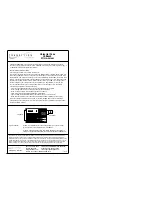
3 DMR function
9
Configuring Audio Profile (Audio Profile) (
Speaker Type
)
Type
‘
■
Standard model
■
Basic model
Description
Speaker Type
is the function to configure the type of external speaker to be connected to the transceiver and
keep the audio in optimum condition.
The external speakers to be connected to the transceiver have different audio characteristics. Using this function
equalizes audio characteristics that differ for each speaker, and can correct the demodulated sound when a
digital signal is received.
Speaker Type
Speaker Type
Description
None
Disables the capability to adjust audio characteristics.
This configuration is used when not wanting to change the audio characteristics.
Speaker 1
KMC-45D
Speaker 2
KMC-48GPS
Speaker 3
KMC-21
Speaker 4
KHS-7, KHS-8, KHS-22, KHS-25, KHS-26, KHS-27, KHS-31
Speaker 5
KHS-23, KHS-35F
Speaker 6
KHS-10
Speaker 7
EMC-11, EMC-12
Speaker 8
Reserved. Audio quality is same as None.
Speaker 9
KHS-29F
Speaker 10
KEP-2
Speaker 11
KHS-8NC
Operating the transceiver
-
-
Note
If using an external speaker unlisted in the table above, configuring “None” in Speaker Type is recommended.
Configuration using FPU
Speaker Type
: Edit > DMR > Conventional 2 > Audio > RX Audio Response
PF_BTN[Menu]
Edit > Button Assignment > Menu
Viewing the Receive History (Stack) (
Retain Stacked Message
)
Type
‘
■
Standard model
□
Basic model
Description
In Stack Mode, the incoming call history (Caller ID) can be viewed. In an analog system (FleetSync), an NXDN
system, or a DMR system, in addition to the incoming call history, received Status Messages and Short
Messages can be viewed in Stack Mode. Received IDs and messages are stored in the stack memory of the
transceiver.
In order to store the received IDs and various messages in the stack memory of the transceiver, Caller ID Stack,
Status Message Stack, or Short Message Stack needs to be individually enabled by using KPG-D6/ D6N.
The “ ” icon appears if messages are stored in the transceiver. If there is an unread message, the “ ”
icon blinks.
Pressing the PF_BTN[Stack] places the transceiver in Stack Mode. Or, the transceiver can also be placed in
Stack Mode by selecting “Stack” after placing the transceiver in Menu Mode by pressing the PF_BTN[Menu].
Retain Stacked Message
is the function to retain the stored Caller IDs, Status Messages, or Short Messages in
the stack memory of the transceiver even after the transceiver is turned OFF.
Operating the transceiver
-
-
Note
-
Configuration using FPU
Short Message Stack
,
Retain Stacked Message
:
Edit > Optional Features > Optional Features 1 > Common 4 > Stack Condition










































